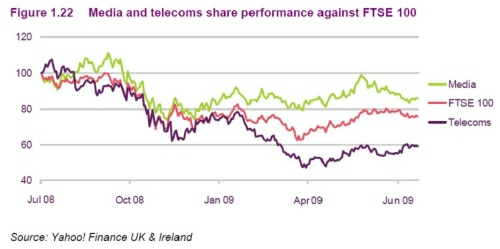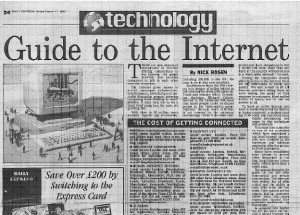In the middle, as we are, of the birthing process of the Digital Economy Bill it is interesting to see how laborious this can be (and I have 4 kids!).
One of the gripes the ISP industry has (regular visitors to trefor.net will have become familiar with a few of them) is the fact that when it comes to copyright protection and the move to kill off illegal downloads there is too much stick and not enough carrot.
The big concern is that the Bill as proposed helps to compensate the music industry for losses incurred to an outdated business model and therefore removes the incentive for rights owners to embrace new business models.
ISPs are extremely frustrated by the difficulties in securing the licensing that is needed to offer consumers legal alternatives to illegal downloading. It has always been our view that a voluntary or legislative commitment to enforcement should only be introduced on the condition that rights-holders also commit to significant licensing reform.
Moreover there is a particular concern that some rights-holders are purposefully resisting reform of the licensing framework because they view legal models of online content distribution as a threat to their own existing revenue.
Lets take a look at some of the difficulties. These are some examples compiled by the Internet Services Provider Association as part of an as yet unpublished paper. There is some brain work involved here though I have tried to simplify it, largely so that I can understand the problems myself.
Existing problems
Taking a fully licensed music service to market is lengthy and onerous. Even if all the rights owners offered easy ways to access their catalogues, the complex contractual obligations wrapped around Intellectual Property rights in the reproduction, performance, and ‘making available’ of both musical works and sound recordings means that there is no guarantee of ending up with a fully licensed service.
Consumer expectations for online music are sky high. Given that many of them share a significant volume of unlawful music over P2P networks consumers are used to being able to download any track. Gaps in the available legal alternatives caused by licensing problems are not well looked upon and legal music services that attempt to offer incomplete catalogues are viewed as uncompetitive when compared with unlawful file-sharing.
Direct licensing or withholding
There are also additional obstacles to efficient music licensing which add cost and risk to the emerging digital entertainment industry.
Rather than using collective or wholesale clearing houses most music rights owning parties insist on licensing the use of their catalogues directly.
This means that direct licensing multiplies cost and difficulty for the licensee and allows each licensor the ability to set terms and rates that could critically damage the viability of a service. Licensors can also choose to withhold the catalogue required to offer a compelling customer proposition.
Ensuring that licensors negotiate through a collective or wholesale clearing house would assist licensees in securing the licenses that are required to offer a service that is attractive to consumers.
Territoriality
Rights-holders are currently able to limit the operations of music services to specific countries which enables them to introduce price discrimination from country to country. Also a single piece of music may well have different owners in different countries which adds cost and complexity to the initial rights negotiations and to the ongoing payment systems.
Advances
The larger rights owners usually demand advance payments and deal and delivery fees. These can be many times the expected royalty payments for the use of the music during the term of the agreement. This introduces a financing risk as well as adding a start-up cost to launching a new service. Often these will be staged as quarterly payments, with the threat of catalogue withdrawal or even insolvency proceedings should they not be met.
These advances are likely to be prohibitive to a provider launching a service. Advances also reduce transparency to other music stakeholders as they break the relationship between sales and royalty payments.
Short-term deals
Many deals have a one-year term with no obligation on the rights holder to renew. This will in almost all cases be considerably shorter than the planning horizon for a large operator and makes a business case more of an act of faith rather than a serious basis to roll out services. It also makes it difficult for a service provider to guarantee that it will be able to fulfil contracts with its own customers.
For example if half way through a one year contract with a consumer a service provider has a certain catalogue withdrawn from its own deal with the rights-holder then that SP is going to be unable to fulfil its own obligations. It could also turn a profitable service into a loss making entity completely outside the control of the service provider if the rights holder decides to jack up the cost.
Minima
Rights owners use contractual minimum payments in order to inflate their revenues over and above the value of the music that is actually sold by a service. In some cases this is relatively benign, such as setting a minimum wholesale price per track and taking the greater of that or a percentage of retail price.
It can, however, be used to set a price per subscriber that is higher than the licensor’s pro-rata revenue share or it can be set across an entire service so that the rights-holder receives a fixed percentage even when their pro-rata share drops. The effect of this is to compel the licensee to pay out over 100% of the royalty pool, eating into margins or operating costs.
Customer proposition approval
Rather than set wholesale pricing and allow operators to develop compelling services, music rights owners seek control over most aspects of the consumer offering and look to insert conditions in contracts that require any changes to be agreed in advance. This would seem to be an anti-competitive measure and detrimental to the creation of alternative models of distribution.
Arbitrary conditions
Rights holders can sometimes put pressure on music services to accept arbitrary conditions, such as using a preferred provider for some aspect of the service, or committing to a guaranteed placement for priority releases. Some other arbitrary conditions might include action against piracy either as a pre-condition of licensing or a commitment included in a contract. It might also include access to a large amount of consumer behaviour data including data that does not relate to the music included in the contract.
All this, and I’m sure the experts can probably dig out more examples, adds up to an extremely difficult environment for the creation of legal music download services.

